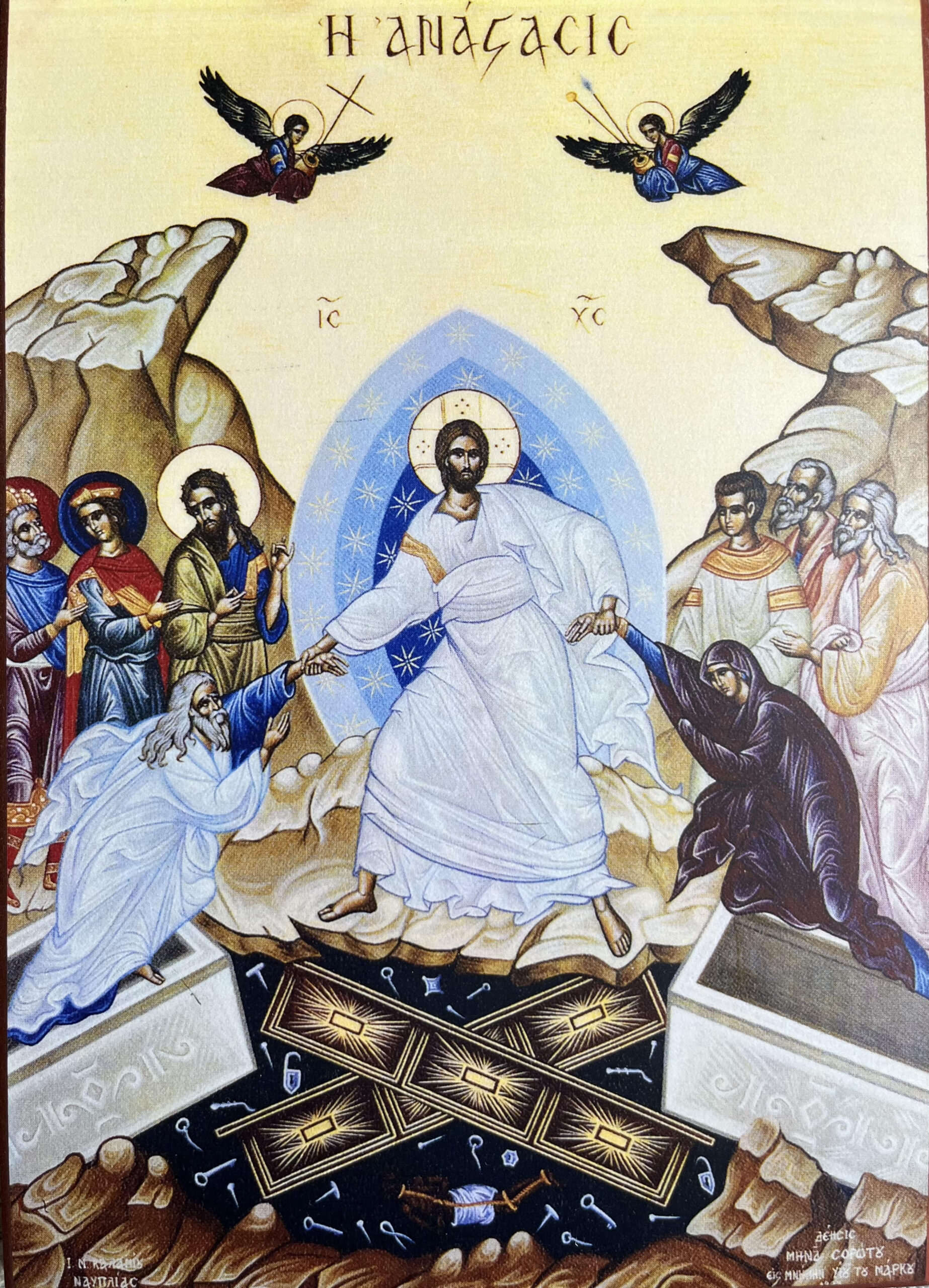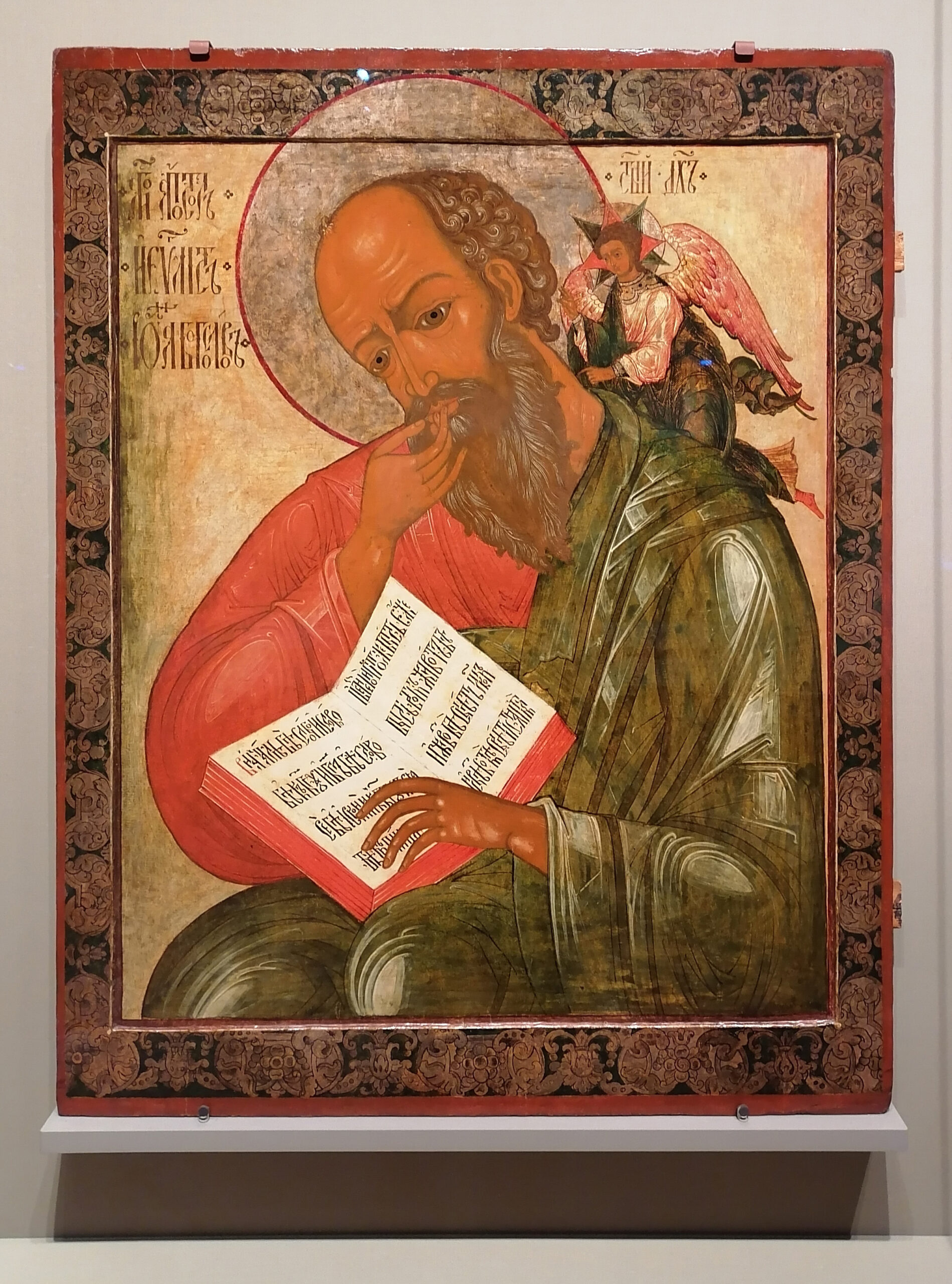Praise You the Lord, and exalt Him to all ages.
~Hymn of the Three Youths, Vesperal Liturgy, Holy Saturday morning, Trans. by Fr. George Papadeas
—
Now the king’s servants who threw them in did not cease feeding the furnace fires with naphtha, pitch, tow and brush. And the flame streamed out above the furnace forty-nine cubits, and it broke through and burned those of the Chaldeans whom it caught about the furnace. But the angel of the Lord came down into the furnace to be with Azariah and his companions, and drove the fiery flame out of the furnace, and made the midst of the furnace like a moist whistling wind, so that the fire did not touch them at all or hurt or trouble them. Then the three, as with mouth, praised and glorified and blessed God in the furnace, saying: “Blessed are Thou, O Lord, God of our fathers, and to be praised and highly exalted forever.”
Song of the Three Young Men 23-29
It seems that each year, I appreciate the service on Holy Saturday morning more deeply. It is a summary of the history of salvation, from the creation until the second coming. The service begins with Psalm 104, sometimes called the Psalm of Creation, (the Psalm that begins Vespers) which recounts how God created everything. These vespers are the vespers of Pascha (of the Resurrection) so the hymns give praise to God for the Resurrection. They are the hymns we discussed in the previous reflection about how Christ destroyed the power of Hades. Next is the entrance hymn of Vespers, “Gladsome Light” (or Fos Ilaron in Greek), another hymn of praise to God.
After the entrance hymn, we read from three prophecies. The first prophecy is from Genesis 1, the story of Creation. The book of Genesis begins:
In the beginning, God created the heavens and the earth. The earth was without form and void, and darkness was upon the face of the deep; and the Spirit of God was moving over the face of the waters. And God said, “Let there be light”; and there was light. (Genesis 1:1-3)
Not only do these verses reveal that God created everything, but that everything was created from nothing, and that God created in Trinity. The Holy Trinity is revealed in these verses. God the Father created, the Spirit of God was moving over the waters, and the “Word” of God gave the command “Let there be light.” This will take on greater significance in the Gospel of John, chapter one, which will be read at the Paschal Divine Liturgy, because Jesus Christ will be revealed as the “Word” become flesh. We will discuss this further in a future reflection.
The second prophecy is the story of Jonah. Jonah was told by God to go preach at Nineveh. He refused God’s order and boarded a ship bound for Tarshish. A great storm came up around the ship, so that everyone on board thought that the ship would sink and they would drown. The men on the ship decided to cast lots to see whose presence had brought misfortune upon them. And the lot fell to Jonah, who admitted that he had run from the command of God. Jonah told them to cast him into the sea, but they initially refused. When they saw that the sea was growing more and more tempestuous, they finally threw Jonah into the sea. God caused a great fish (in popular Christian literature, sometimes called a whale) to swallow Jonah. Jonah was in the belly of the fish three days and then the fish vomited out Jonah, giving him new life. This prefigures the three day burial of Christ in the tomb.
The third prophecy is from the Book of Daniel. We are introduced to four Hebrews in the opening chapter of Daniel, whose names are Daniel, Hananiah, Mishael and Azariah. They were brought into the king’s court and shown favoritism from King Nebuchadnezzar. Their names were changed to Belteshazzar, Shadrach, Meshach and Abednego. At this time, the Hebrews were in exile in Babylon, so the fact that four of them were honored by the king and given positions of trust and responsibility is quite remarkable. These men, however, remained loyal to the God of Israel, even in exile.
Advisors of the king encouraged him to build a statue and have people worship the statue, and told the king that anyone who did not worship the statue should be burned in a fiery furnace. They then made the king aware that Shadrach, Meshach and Abednago would not worship the statue (Daniel is not mentioned during this part of the book of Daniel but has his own trial later in the lion’s den for not worshipping the king.) So Shadrach, Meshach and Abednego were bound and cast into the fiery furnace.
The three youths sang a hymn to God. This is an apocryphal book which is not part of the Old Testament in certain versions of the Bible. However, the Apocrypha are part of the Septuagint (Greek) Bible and the Song of the Three Young Men has been inserted into the book of Daniel, chapter three. It is a hymn of praise to God, which we also sing a portion of on Holy Saturday morning.
King Nebuchadnezzar watched this scene about the fiery furnace, that the people who bound the three young men were burned and that the three young men were unhurt. In Daniel 3:24-25, the king said to his counselors: “’Did we not cast three men bound into the fire?’ They answered ‘True, O king.’ He answered ‘But I see four men loose, walking in the midst of the fire, and they are not hurt; and the appearance of the fourth is like a son of the gods.’” Indeed, this mysterious fourth person is a pre-figuring of Christ, walking in the flames with the three righteous young men.
Thus, in this service, we see a summary of the Old Testament, how even in exile, a vestige of faithful people remained, and God remained faithful to them. God was still with the people in their brokenness. The next reflection will be about the rest of the service on Holy Saturday morning, how Christ redeemed the world through His Cross and Resurrection, the establishment of the church, and how we are to worship Christ until He comes again.
All the words of the Lord, bless the Lord; praise and exalt Him to all ages.
Bless the Lord, angels of the Lord, and the havens of the Lord
Bless the Lord, you waters that are above the heavens and all the powers of the Lord.
Bless the Lord, sun and moon and stars of heaven.
Bless the Lord, light and darkness, nights and days.
Bless the Lord, showers and dew and all winds.
Bless the Lord fire and warmth, cold and heat.
Bless the Lord, dews and snows, frosts and cold;
Bless the Lord, frosts and snows, lightnings and clouds.
Bless the Lord, earth, mountains and hills and all things growing on it
Bless the Lord, fountains, seas and rivers, whales and all that move in the waters.
Bless the Lord, fowls of heaven, all animals and all beasts.
Bless the Lord, sons of men, bless Him and let Israel bless.
Bless the Lord, priests of the Lord, servants of the Lord.
Bless the Lord, spirits and souls of the righteous, holy and humble men of heart.
Bless the Lord Ananias, Azarias and Misael;
Bless the Lord, Apostles, prophets, and witnesses of the Lord.
We bless the Father, Son and Holy Spirit the Lord,
We praise and exalt the Lord to all the ages.
We praise, we bless and worship the Lord.
We praise and glory the Lord to all the ages.
(Hymn of the Three Youth, Vesperal Liturgy, Holy Saturday morning, Trans. by Fr. George Papadeas, Adapted from the book Song of the Three Youths, verses 37-66)
God is faithful, even when we are not. God is present, even in our brokenness.

